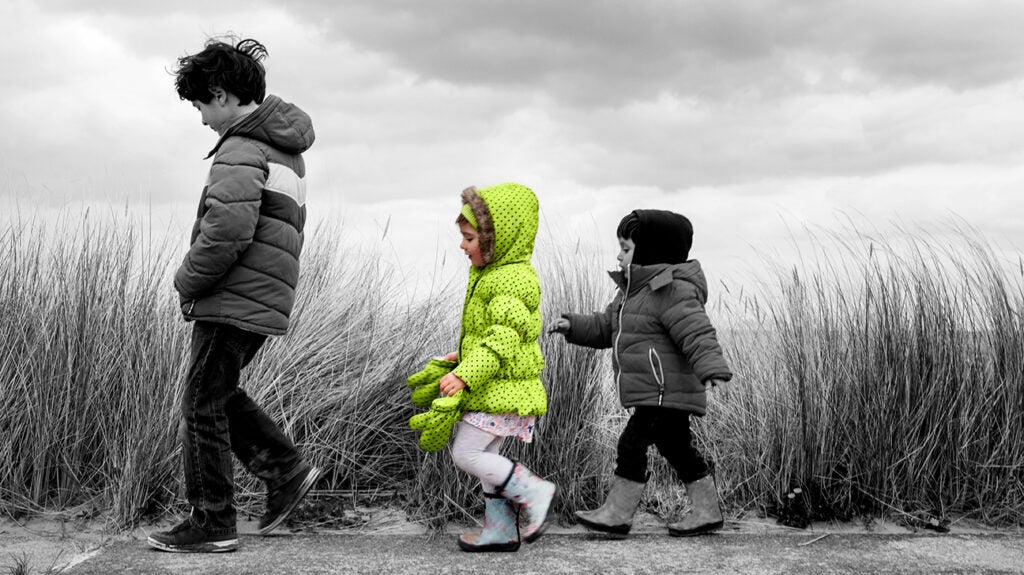
“OMG, nobody tells me anything!” says every middle child everywhere. Whether the topic of interest stems from where the family is going on vacation to voting on which Hulu show to watch, the middle child never gets a look in. And I should know. Being the fifth of 10 children, and the fifth girl in a row, I basically dragged myself up. In fact, were it not for the local herd of coyotes that gave me the attention I craved, I would have had to rely on the once-yearly-visiting uncle.
I jest, I jest.
However, the birth order in which one lies does hint at how a personality develops. And for middle children, a relative lack of attention through the early years certainly makes them more flexible as adults.

The middle child is overlooked most of the time. In fact, there is an entire syndrome dedicated to us:
Middle Child Syndrome
The Middle Child exhibits traits that are inherently born from the lack of attention from our parents, siblings, etc. Of course, to the middle children of the world, this abhorrent neglect is what defines us. Being a middle child is not something anyone aspires to be.
Unlike the first child, who is under the direct supervision of parents, the middle child is never groomed to succeed like they are. The first child believes that the sun shines from their every orifice. And sure, why wouldn’t they? They don’t know any better.
Nor are we the last child, who benefits from the chill, experienced parent. The baby of the family gets away with all sorts of mischief and is fully supported in their eventual quest to go find themselves.
But we middles are different. We are born into a role of peacemaker, seeing both sides, and in no uncertain terms told to shut up and accept the louder, more important people around us. We accept the role (mainly because we have little choice) and move into a life of indifference from the family. They know we are there, but much like the old family dog, we become part of the furniture of other lives.
We are not the main character. This is not a movie about us. In fact, the middle child is the plain, yet witty “best friend” character who would be killed off prematurely in that movie. This of course, naturally paves a way for the main character (first child usually) to get on with the serious business of saving the world and such. But that is precisely how we learn to survive. We don’t shine as brightly as the others and tend to fly under the radar and excel silently. Welcoming praise or affirmations is foreign to us. It being absent for a lifetime, we wouldn’t know what to do with those things.
The Advantages of Being a Middle Child
Always Learning from Others’ Mistakes
Being a middle child makes you an observer. When another sibling gets in trouble, the middle child is mentally taking note of how it all worked out for them. Middle children can tweak a problem for others and turn it into a solution for everyone.
Competitive Nature
When middle children have to hurry to catch up with the others, or wait for the bathroom, or eat quickly at mealtimes to get seconds before they are gone, it makes us inherently competitive. We’re constantly on the lookout for ways to survive. This makes us very good at our jobs. We find ways around situations—instead of stalling at the first obstacle, we maneuver around it, seeing it from another viewpoint, and find a quick solution. We make the most of the situation.
Independence
Being left alone frequently, not asked about whereabouts is a wonderful thing as a child. I relished my alone time, reading in corners of the house, uninterrupted by curious parents. By the time I came along, my parents were well beat down by the older ones. This gave me freedom to not have to answer to anyone. I could listen to music, read until all hours of the day and night, and soak up knowledge about life without lectures. The sense of independence that some middle children feel in childhood can also serve them well later in life.
Peacemakers
Middle children tend to go with the flow. We have made up our own minds silently about things. When democracy in a family unit fails (generally because the loudest ones need to be quieted) and the older ones get to decide on practically everything, you’re down with it. It’s “whatever.” You just go with the flow. This builds fantastic tolerance skills.
When it comes down to it, the middle children of the world are the tolerant, inclusive ones. We see those who are not seen by others. Middle children can make great colleagues and team players, since they tend to know how to keep the peace. As a natural negotiator, we see both sides of an argument. We also follow the rules, unless of course those rules are stupid and put in place to benefit absolutely no one. In that case, we follow our own path, which is usually spectacularly better.
A Dying Breed
Much like the redheads of this world, the middle child is a dying breed. In fact, as a crowdsourcing exercise, I asked for middle child stories from this writing group but did not receive any. As it happens, the reason I did not get any was not because I was being ignored (thought for a fleeting moment, as a middle child, I believed this to be true). But the reality is that I live and breathe among first and last children. There are very few of us “middles” left. We are a dying breed.
Growing up in the 80s, the vast majority of my friends in school had more than one sibling. But today, that is not the case. Many families (aside from those that are religious and those that are wealthy, or both) do not have more than two children. There are many reasons for this, none of which I will go into for this article. But the consequences of the absence of middle children have far-reaching effects on society that cannot be overlooked. A society that does not exhibit middle child qualities has lost a part of its soul, and this loss should be grieved.
Middle Children Make Life Better
It’s true that the middle child generally gets the raw deal when it comes to new clothes, books, and attention, generally. But come on, isn’t the middle part of the sandwich the most delicious? And those bookends on either side of the shelf are only standing there to hold the vast volumes of information that stand in the middle, worlds away from view. Aren’t conversations made more enjoyable when the formalities of the first few greetings are over with, and the heart of the person is seen deep into the middle of the conversation?
Any psychologist will tell you that they rarely, if ever, treat middle children. Let’s face it: Without the middle, the world would be less. Less chill, less considerate, and possibly less intelligent. In a world absent of the intelligent peacemaker, healthy competition would cease to exist, and wars would be rife.
So, on August 12, if you have nothing better to do with your first or last born and are lucky enough to have more than two children, celebrate Middle Child Day. Pat that middle child’s head occasionally. Nod in acknowledgement every now and then. But don’t make us the center of attention suddenly. We don’t want that. We middles are used to being underestimated. Knowing that the world does not revolve around us is our rare gift to the world. Let’s just leave it at that, shall we?
More interesting articles on middle children and their importance:













